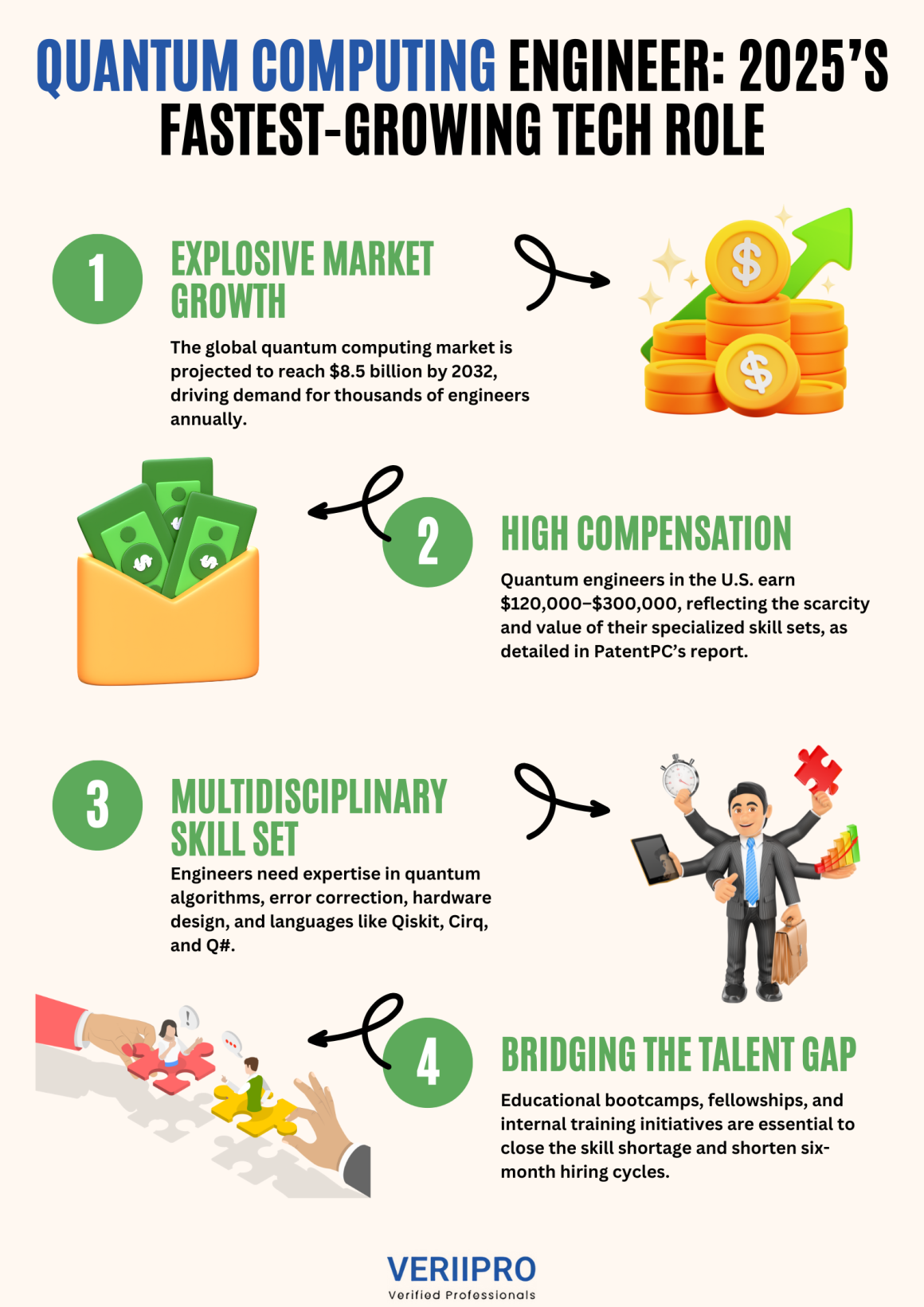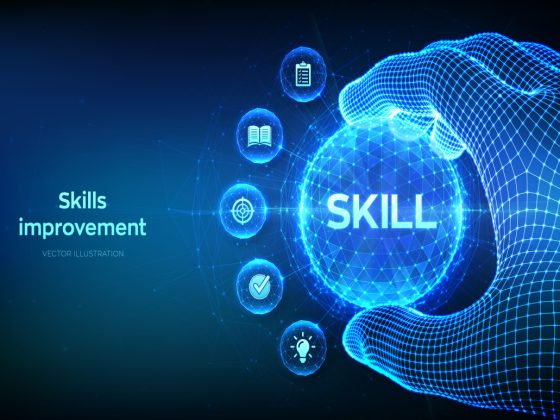Quantum Computing Engineer: Inside the Fastest-Growing Tech Career of 2025
In 2025, quantum computing engineering has emerged as one of the most sought-after professions, driven by unprecedented investments and rapid technological advances. As organizations across multiple sectors race to harness the power of quantum machines, the demand for skilled engineers capable of designing, programming, and maintaining quantum systems has skyrocketed. According to industry analysts, the global quantum computing market is projected to reach $8.5 billion by 2032.

Market Demand and Job Growth
Quantum computing engineers occupy a niche where physics, computer science, and electrical engineering converge. As of mid-2025, estimates suggest the industry will require between 10,000 and 20,000 new hires annually to support research, development, and commercialization efforts. Job postings for quantum roles have increased by over 450 percent between 2018 and 2023, signaling both the immediacy and the scale of hiring needs, according to PatentPC’s 2024 job‐market report. This surge is not limited to tech giants; startups and research institutions alike are actively recruiting talent, eager to stay at the forefront of quantum innovation.
Core Skill Sets and Specializations
Quantum computing engineering demands a multifaceted skill set. Quantum algorithm development—the process of creating algorithms optimized for quantum hardware—remains a top priority, as it directly influences computational speedups over classical approaches. Engineers also need proficiency in specialized programming frameworks such as Qiskit, Cirq, and Q# to build and test algorithms on existing quantum processors. On the hardware side, device engineering skills involving superconducting qubits, ion traps, or photonic architectures are essential for designing and troubleshooting quantum chips. Complementary expertise in quantum error correction and quantum information theory further distinguishes engineers capable of scaling quantum systems beyond current limitations.
Education and Training Pathways
Given the high barrier to entry, many professionals transition into quantum computing through specialized educational programs. Bootcamps and certificate courses—offered by institutions like MIT’s Quantum Computation program, Stanford’s Quantum Faculty courses, and IBM’s Qiskit tutorials—provide accelerated, hands-on training for students and mid-career professionals aiming to pivot into this field. Additionally, quantum fellowships and research grants (such as national initiatives in the U.S., Europe, and Asia) fund graduate-level research, fostering collaborative projects between academia and industry. Internships at leading labs—such as those run by PsiQuantum or Google Quantum AI—offer invaluable real-world experience, bridging theoretical knowledge with practical implementation.
Industry Applications
Quantum computing’s potential spans numerous sectors. In finance, quantum algorithms promise optimized portfolio management and faster risk analysis, attractive to hedge funds and investment banks, as discussed in this Forbes article on quantum in finance. In pharmaceuticals, quantum simulations of molecular structures can dramatically accelerate drug discovery by solving complex chemical problems that are intractable for classical supercomputers, illustrated by recent developments in Nature’s coverage of quantum drug discovery. Energy and logistics benefit from quantum-enhanced optimization, improving everything from supply-chain management to materials science. Even national security agencies are investing heavily in post-quantum cryptography to guard against future threats posed by fault-tolerant quantum machines, guided by frameworks outlined at NIST’s Post-Quantum Cryptography project.
Compensation and Benefits
Unsurprisingly, quantum computing engineers command premium salaries. In the United States, entry-level positions start around $120,000, with mid-level roles averaging between $150,000 and $180,000 per year, according to PatentPC’s 2024 salary data. Senior engineers and researchers—especially those at prominent firms like Google, IBM, or Microsoft—can earn upwards of $200,000–$300,000 annually, often supplemented by stock options and performance bonuses. Beyond financial incentives, companies frequently provide access to cutting-edge research facilities, comprehensive health insurance, retirement plans, and generous R&D budgets to fuel innovation.
Leading Employers and Geographic Hubs
Several organizations have established themselves as quantum computing powerhouses. Google’s Quantum AI lab in Santa Barbara, IBM’s Quantum Research division in Yorktown Heights, and Microsoft’s Quantum program in Redmond consistently rank among the top employers for quantum talent. Startups like PsiQuantum (headquartered in California) and Rigetti Computing also aggressively expand their teams, seeking quantum physicists, software engineers, and hardware specialists. Geographically, Santa Barbara, Boston/Cambridge, and New York City remain leading U.S. hubs, but emerging centers are gaining traction in Colorado, Texas, and North Carolina due to favorable state-level funding initiatives.
Overcoming Talent Shortages
Despite the surge in demand, there remains a significant talent shortfall. By 2025, the industry faced a gap where only one qualified candidate was available for every three open quantum computing roles. The extended hiring cycles—often spanning six months—reflect the scarcity of professionals with the specialized combination of quantum physics and software/hardware engineering skills. To address this gap, companies are increasingly investing in internal training programs, offering current employees pathways to upskill in quantum computing frameworks and join cross-functional quantum teams.
Future Outlook and Integration
As quantum hardware continues to mature, engineers will play a pivotal role in integrating quantum systems with classical infrastructures. Hybrid architectures—where quantum processors handle specialized subroutines while classical computers manage broader workflows—are expected to dominate early commercial applications. Additionally, the convergence of quantum computing and artificial intelligence (quantum machine learning) promises breakthroughs in pattern recognition and data analysis, creating entirely new classes of applications. Aspiring professionals can explore resources like PennyLane and TensorFlow Quantum to get started in quantum-enhanced AI.
Getting Started: Tips for Aspiring Engineers
For those aiming to break into this field, a strong foundation in linear algebra, quantum mechanics, and computer science is non-negotiable. Prospective engineers should begin with online courses—such as MIT’s “Quantum Computation” or IBM’s Qiskit tutorials—to grasp core concepts. Building a portfolio of open-source quantum projects on platforms like GitHub can demonstrate practical proficiency to recruiters. Joining quantum-focused communities (e.g., Qiskit Slack channels) and attending industry conferences like Q2B or IEEE Quantum Week also help expand networks and stay current on emerging trends.
Looking Forward
In 2025, the role of a quantum computing engineer represents a thrilling intersection of cutting-edge science and real-world problem solving. As industries increasingly recognize quantum technology’s transformative potential, engineers skilled in quantum algorithms, hardware design, and system integration will remain in exceptionally high demand. For those prepared to embrace this challenge, the rewards—in terms of both career growth and technological impact—are unparalleled. Looking for opportunities in quantum technology? VeriiPro is here to help!








